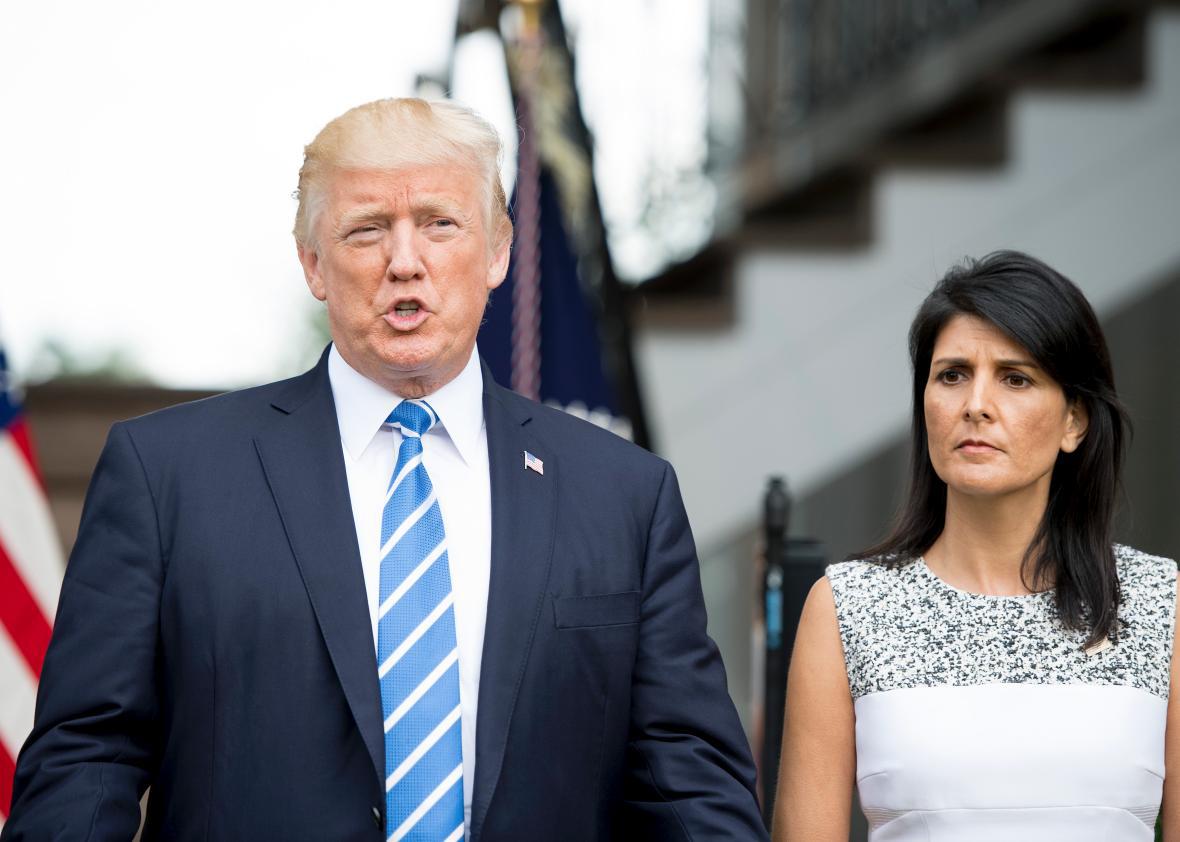In a speech at the American Enterprise Institute on Tuesday, Ambassador to the United Nations Nikki Haley gave what might be a preview of how President Trump could finally kill the 2015 nuclear agreement with Iran.
Most of Haley’s speech was familiar: a litany of the Iranian regime’s crimes and malfeasances dating back to 1979 as well as criticism of the “very flawed and very limited agreement” forged between the Obama administration, Iran, five other countries, and the European Union. Haley didn’t dispute the assessments of international inspectors and U.S. intelligence agencies, both of which concluded that Iran is in compliance with the deal, no matter how flawed and limited it may be. These assessments are why, even though Trump has said he wants to dismantle what he has called “the worst deal ever,” he has now twice, reluctantly, certified to Congress that Iran is in compliance. But this certification process is where Haley sees an opening.
The administration is required to make this certification every 90 days in order for Iran to continue to receive relief from sanctions. This requirement is not in the text of the agreement itself, but in an act passed by Congress in 2015, known as the Corker-Cardin law. That law was meant to constrain the Obama administration, but has unintentionally ended up forcing Obama’s successor to take ownership of an agreement he loathes. Now Haley is proposing kicking the ball back to Congress.
In her speech Tuesday, Haley noted, correctly, that the law states the president must certify not only that Iran is complying with the agreement, but that continuing to provide sanctions relief is “appropriate and proportionate to the specific and verifiable measures taken by Iran with respect to terminating its illicit nuclear program” and “vital to the national security interests of the United States.” Haley argues that Iran’s continued ballistic missile tests demonstrate that it is not terminating its nuclear program, even if they are not “technical violations” of the deal, and that given the support Iran gives to groups like Hezbollah, the sanctions relief provided by the deal is detrimental to U.S. national security interests. So Haley suggests that the law allows Trump to declare Iran noncompliant, even if it is complying. Even better, from the Trump administration’s point of view: Trump wouldn’t really have to take responsibility for the consequences of withdrawing from the deal.
“If the President chooses not to certify Iranian compliance, that does not mean the United States is withdrawing from the [deal],” Haley said, noting that under the law, Congress would then have “60 days to consider whether to re-impose sanctions on Iran.” The law provides an expedited process for Congress to re-impose sanctions. Haley suggested it should decide whether to do so based on more than just the deal itself.
“During that time, Congress could take the opportunity to debate Iran’s support for terrorism, its past nuclear activity, and its massive human rights violations, all of which are called for in Corker-Cardin,” she said.
As former State Department staffer Ilan Goldenberg points out, this looks an awful lot like how Trump has handled the Deferred Action for Childhood Arrivals, or DACA, program this week. Both are controversial Obama initiatives that Trump promised his base he would scrap. And both are things that, if scrapped, could create backlash for the president. So why not just wash his hands of both and let Congress deal?
The problem in this case is that U.S. allies have been very clear that the agreement was intended to deal with Iran’s nuclear program and have expressed little desire to revisit the issue. Without evidence of a significant violation, this odd Haley argument that Iran is noncompliant with the spirit of the agreement but not the letter of it, is not likely to carry much weight with the other parties. It also would be strategically dumb, because Iran would be freed from its commitments under the deal and the U.S. would have far less leverage than it did before the deal was signed.
Will Trump do it? “While I have discussed it with him, I do not know what decision he will make,” Haley said Tuesday of Trump’s deliberations. “It is his decision to make, and his alone.” However the administration tries to frame it, the responsibility should be his alone as well.
